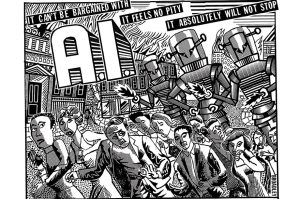The Trump economy has defied all skeptics and naysayers. Unemployment is at half-century record lows, wages are up, and Wall Street opened November by bouncing back from a rocky October. Trump was supposed to be a reckless leader who would panic the markets. He hasn’t. His tariffs were supposed to torpedo the economy. They haven’t. If Americans vote on jobs, wages, and the business climate come Tuesday, Republicans will keep the House of Representatives and expand their Senate majority.
But do voters ever think of midterm elections as a referendum on the economy? Conventional wisdom says no, but the reality is more complicated. Republicans lost 26 seats in Ronald Reagan’s first midterm election in 1982 — a big loss by the standards of the day, but perhaps not so surprising in light of the fact the country had been in a 16-month recession that only ended the month of the election. The ‘86 and ‘90 midterm elections, by contrast, saw only single-digit House losses for Republicans with Reagan and George H.W. Bush in the White House. The economy had been humming along in 1986 but entered recession in July 1990. Had voters not yet felt enough pain to punish the president’s party? Or did they blame the Democrats in control of Congress as much as Bush in the White House? Either way, economics was not necessarily at the forefront of voters minds, with US troops already deployed to the Middle East and the Persian Gulf War about to commence in January ‘91.
The Clinton midterms also serve up a mixed verdict. Democrats lost 54 seats in 1994, an historic rebuke to Bill Clinton in the midst of a favorable economy. But in 1998, with the economy booming, Democrats defied the historical trend and actually gained seats in the House. The media buzz at the time presented the midterm as a referendum on the Monica Lewinsky scandal and the prospect of impeachment. But the economy surely didn’t hurt Clinton’s party. Beyond even that, however, the sheer scale of the Republican victory in 1994 meant that a correction was probably inevitable. In the presidential election year of 1996, Republicans had lost only 2 seats (with one Republican, Jo Ann Emerson, elected as an independent). The Republican takeover of Congress in 1995 touched off a realignment, with many Democratic office-holders switching parties or retiring. That made for an unsteady Democratic Party in 1996, but by ‘98 it was ready to compete again, and marginal Republican pickups from 1994 gave way.
As in 1990 under the first President Bush, war dominated the midterm elections under George W. Bush. In 2002, Republicans got their turn defying the historical trend and picking up seats with a member of their party in the White House. The 9/11 attacks had happened little more than a year earlier, and the Iraq War was four months away. By 2006, Americans were sick of conflicts in the Islamic world and turned against Bush’s party decisively, costing Republicans 31 House seats in total, as well as control of both the House and the Senate. The economy then was still a year away from the Great Recession. But between the wars and a variety of Republican gaffes and scandals, the economy was not the defining issue of the election. (And for that matter, not all the economic news was so good: gas price had been rising steadily for three years.)
With growth, employment, and wages all lagging in 2010 and 2014, Barack Obama’s midterms went badly for his party. Tuesday will be a test of whether excellent numbers in those three categories translate into dramatically different results for Trump, holding Democratic gains in the House to below the threshold of 23 seats they need to pick up to win control. The prospect of Republicans gaining House seats themselves on the strength of the economy can probably be dismissed, however, based not only on present polling but the absence of the conditions that made the gains of a president’s party in 1998 and 2002 possible. If ‘98 was in part an adjustment in the Democrats’ favor after the Republican gains of 1994 and the shakeout that followed it, ‘18 is almost certainly going to be another adjustment in the Democrats’ favor after the Republicans’ massive gains under Obama. Republicans are primed to lose seats less because of Trump than because of the magnitude of the gains they made under Obama: they picked up a lot of tough seats to defend.
The outcome of midterm elections in the Senate has generally tracked the outcome in the House, though in the 1986 midterms Senate Democrats did proportionally far better than their House counterparts. Democrats picked up 8 seats. The economy might have favored President Reagan’s party, but the GOP had a particularly weak set of Senate freshmen that year who had first won their seats in 1980 with Reagan at the top of the ticket. Seven of the eight Republican senators who lost in ‘86 were freshmen.
Polls give Republicans a fighting chance to keep the House and good odds of adding to their Senate majority. The economy is a point in the GOP’s favor. A president’s party typically loses House seats even when the economy is healthy—but a healthy economy helps to limit those losses. What hopeful Republicans have to keep in mind, however, is just how well their party did by running against Barack Obama in 2010 and 2014. They don’t have Obama to run against any more, and he may have been better for Republicans in Congress than a healthy economy ever could be.


















